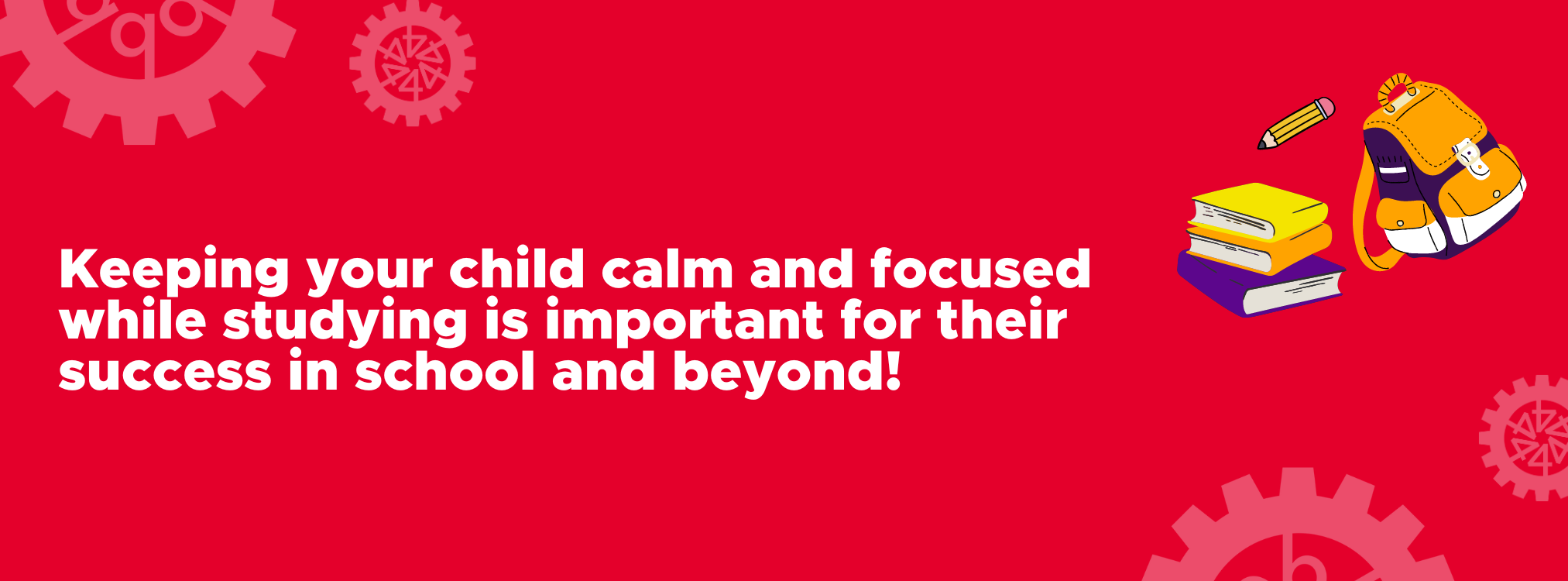Tips for Improving Your Child's Study Habits

Maintaining a calm and focused environment for your child during study sessions is crucial for their academic success and overall well-being. Research indicates that when children are relaxed, their ability to concentrate improves, leading to better understanding and retention of the material.
According to the Australian Psychological Society, chronic stress can negatively affect memory and cognitive functions, making it harder for children to excel in their studies. By fostering a serene and attentive study routine, you’re not only helping with their homework but also contributing to their mental health and equipping them with valuable stress-management skills.
Here’s a guide to support your child in staying on track and reaching their full potential.

Create a Quiet Study Haven
A serene, dedicated study area can have a significant impact. By offering your child a tranquil space free from household distractions, you create an environment conducive to better focus, similar to how a performer thrives with an engaged audience. An organized, clutter-free room helps your child concentrate on their work and minimizes potential interruptions. This peaceful setting is crucial for developing effective study habits and supporting academic achievement.
Studies indicate that a calm environment can greatly improve focus, concentration, and information retention. By minimizing distractions, a quiet study area helps children stay engaged and finish their tasks more effectively. Additionally, this tranquil setting fosters a sense of calm and lowers stress, contributing to a more positive learning experience. Examples of such peaceful study spaces include libraries, study rooms, and dedicated quiet zones at home, all of which offer the serenity essential for academic success.
Remove the Distractions
Distractions can significantly hinder effective studying. To help your child stay focused, ensure their study space is free from interruptions by turning off phone notifications, removing games, and asking other family members to respect study time. Tools such as website blockers and screen time tracking apps can also support their concentration. Reducing these distractions allows your child to fully engage with their work, which is key for information retention and achieving their goals.
A cluttered and disorganised study area can also contribute to distractions and lower productivity. Encouraging regular breaks and physical activity can further reduce the temptation of digital distractions. Parents can promote healthy digital habits by modelling responsible behaviour and providing guidance on digital citizenship. By addressing these digital distractions, children can enhance their focus and academic performance.
Choosing a Quiet Location
When choosing a quiet spot for studying, take into account factors like noise level, lighting, and comfort. Opt for locations with minimal distractions, such as libraries, study rooms, or even outdoor areas. It’s also important to consider proximity to resources like computers, printers, and reference materials. Assess the ambiance and atmosphere of the space to ensure it supports focus and productivity.
Decluttering and Minimalism
A cluttered and disorganised study area can cause distractions and reduce productivity. Adopting a decluttered and minimalist approach can foster a calm and focused learning environment. Begin by clearing away unnecessary items like papers, books, and knick-knacks. Organise essential materials such as notes, textbooks, and stationery using storage containers and labels. Develop a routine for keeping the study space tidy, such as dedicating time each week for maintenance. By reducing clutter, you can minimise distractions and improve your ability to concentrate on your studies.
Build a Consistent Routine
A structured routine offers a consistent framework for study time. Setting specific times each day for studying helps your child develop a habit, making it easier to focus and manage their workload. Consistency lowers anxiety and allows your child to approach their studies with a sense of purpose and readiness, which is crucial for long-term academic success. A well-organised routine can greatly enhance your child's daily life and overall well-being.
Set Achievable Goals
Setting clear, achievable goals helps your child stay focused and monitor their progress. By breaking tasks into manageable steps, you provide a sense of direction and purpose. Celebrating these small successes keeps your child motivated and reinforces positive study habits. Clear objectives also help your child grasp the overall purpose and meaning of their tasks, which is crucial for maintaining focus.
Mind Their Diet
A balanced diet is vital for concentration and overall cognitive function. Encourage your child to enjoy healthy snacks such as fruits, nuts, and whole grains, while limiting sugary treats and caffeinated beverages. Staying hydrated with water is also key to maintaining focus and energy levels. A nutritious diet supports cognitive function, which is essential for effective learning and academic success.
Offer Positive Praise
Positive reinforcement can greatly boost your child’s motivation and confidence. Recognising their efforts and progress with sincere praise encourages them to keep working hard. Positive feedback enhances self-esteem and strengthens their commitment to their studies, leading to a more positive and productive learning experience.
Be a Supportive Ally
Your child may sometimes need additional support or someone to listen. Offer empathy and assistance when they feel overwhelmed. Your understanding and encouragement can ease their stress and help them feel more capable of handling their workload. A supportive approach fosters a more positive study experience and boosts your child’s confidence in tackling academic challenges.
Setting Boundaries with Family and Friends
Establishing boundaries with family and friends is crucial for maintaining a quiet and focused study environment. Share your child's study schedule and needs with loved ones to ensure they understand when your child is available and when they need uninterrupted time. Set clear expectations regarding noise levels, interruptions, and distractions. Using visual reminders, like a “do not disturb” sign, can help reinforce these boundaries. While it's important to be respectful and open to compromise, prioritising your child's academic needs and goals is essential. By setting and upholding these boundaries, you create a supportive environment that promotes academic success.
Play Calming Music
Background music can sometimes improve concentration for certain children. Classical or instrumental music can create a calming environment that helps your child focus better and provides mental relaxation during study sessions. Try various types of music to see what best supports your child’s study habits. Calming music can alleviate stress and make studying a more enjoyable experience.
Break It Down
Large volumes of study material can feel overwhelming. Using phrases like 'one step at a time' or 'small steps lead to big achievements' can aid in organising and managing study sessions. Encourage your child to divide their study time into smaller, more manageable segments. Techniques such as the Pomodoro Technique - studying for 25 minutes followed by a 5-minute break - can help sustain focus and prevent burnout. Approaching study sessions this way makes tasks seem less daunting and helps keep motivation high.

Consider Extra Tutoring
If your child is having difficulty with certain subjects such as maths and Englishs, additional tutoring can offer valuable support. A tutor provides personalised attention and can clarify challenging concepts, alleviating feelings of overwhelm. This extra assistance helps your child better understand difficult material, which is crucial for academic success.
At NumberWorks’nWords, our dedicated team of tutors and professionals are here to help! Through one-on-one tutoring, we tailor learning experiences to each child’s needs, ensuring they gain both knowledge and confidence while enjoying the process.
With centres across New Zealand, Australia, and the United Kingdom, we’d love to hear from you. Contact us today or book a free, no-obligation assessment to get started.




